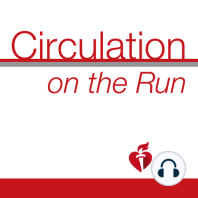16 min listen
Circulation January 3, 2023 Issue
ratings:
Length:
27 minutes
Released:
Jan 3, 2023
Format:
Podcast episode
Description
This week, please join author Judith Hochman, Editorialist Steven Bradley, and Guest Host Mercedes Carnethon as they discuss the article " Survival After Invasive or Conservative Management of Stable Coronary Disease" and editorial “If the Fates Allow: The Zero-Sum Game of ISCHEMIA-EXTEND.” Dr. Greg Hundley: Welcome everyone to our new year 2023, and we are here on this January 3rd edition of Circulation on the Run. I'm Dr. Greg Hundley, Associate Editor, Director of the Pauley Heart Center at VCU Health in Richmond, Virginia. Dr. Peder Myhre: I am Dr. Peder Myhre, Social Media Editor and doctor at the Akershus University Hospital and University of Oslo. Dr. Greg Hundley: Very nice. Well, welcome listeners and this week's feature, ah, very interesting. You know many times patients with stable coronary artery disease, we're seeing a lot in the literature about an invasive strategy versus a conservative strategy. But what happens long term for these patients? What's their prognosis? Well, more to come in the feature discussion. But first, how about we grab a cup of coffee and we discuss some of the other issues in this session. Peder, would you like to go first? Dr. Peder Myhre: Yes, Greg I would love to and the first paper today is very interesting and relates to one of the most important challenges globally, namely climate changes and extreme temperatures. And in this paper, which comes to us from corresponding author, Barrak Alahmad from Harvard Chan School of Public Health in the United States, together with a large international group of authors, investigated the associations between extreme temperatures and cardiovascular cause-specific mortality in 567 cities in 27 countries from 1979 to 2019. Dr. Greg Hundley: Wow Peder, that is a really large comprehensive study. So, how did they perform this analysis? What did they find? Dr. Peder Myhre: So Greg, the investigators collected city-specific daily ambient temperatures from weather stations and analyzed cause-specific cardiovascular mortality and excess deaths in association with extreme hot and extreme cold temperatures. And in total, the analysis included more than 32 million deaths from any cardiovascular cause, which were subdivided into deaths from ischemic heart disease, stroke, heart failure and arrhythmia and at extreme temperature percentiles. And that is defined as heat above the 99th percentile and as cold below the first percentile were associated with a high risk of dying from any cardiovascular cause, ischemic heart disease, stroke and heart failure as compared to the minimum mortality temperature, which is the temperature associated with least mortality. And Greg, across a range of extreme temperatures, hot days above the 97.5 percentile and cold days below the 2.5 percentile accounted for more than two and more than nine excess deaths for every thousand cardiovascular death respectively. And heart failure was associated with the highest excess death proportions from extreme hot and cold days. So Greg, it seems like extreme temperatures really impact the cardiovascular mortality across the globe. Dr. Greg Hundley: Yeah, beautiful description Peder. And I think what was really exciting about that particular article is you had results from 27 countries. Wow, so really quite a global study and very informative. Dr. Peder Myhre: Yes, indeed very impressive. Dr. Greg Hundley: Well, Peder my next study comes to us from the world of preclinical science. And Peder, these investigators led by Professor Jose Luis de la Pompa from CNIC, evaluated two structural cardiac diseases, left ventricular non-compaction and bicuspid aortic valve. And they wanted to determine if those two conditions were caused by a set of inherited heterozygous gene mutations affecting the notch ligand regulator, Mind bomb-1 and co-segregating genes. Dr. Peder Myhre: Okay Greg, so we are looking at mechanisms for non-compaction and bicuspid aortic valve. What did they find? Dr. Greg Hundley: Righ
Released:
Jan 3, 2023
Format:
Podcast episode
Titles in the series (100)
Circulation August 30, 2016 Issue: Circulation Weekly: Your Weekly Summary & Backstage Pass To The Journal by Circulation on the Run
